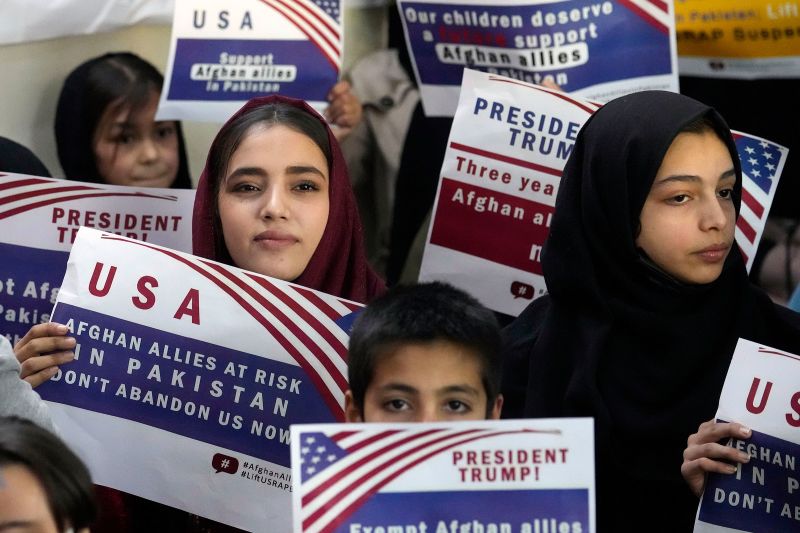
Pakistan issues deadline for Afghan refugees after Trump blocks US resettlement pathway
Shakoofa Khalili was waiting for her husband to return home with bread from the market when she heard their eight-year-old daughter scream from the balcony.
The girl had seen police approach her father in the street outside their safe house in Pakistan’s capital Islamabad and ran to confront them.
The family fled Afghanistan in 2022 to escape the Taliban – militant fighters who filled a leadership vacuum left by the withdrawal of the US and its allies after a 20-year war.
Now the family fears they’ll be deported to Afghanistan, following US President Donald Trump’s order to suspend the US Refugee Admissions Program (USRAP), effectively locking out refugees worldwide who had been on a pathway to US resettlement.
Soon after the executive order was signed, Pakistan’s Prime Minister’s Office drafted a three-stage repatriation plan for “Afghan nationals bound for 3rd country resettlement.”
If they’re not removed by that date, they will be “repatriated to Afghanistan.”
The plan will impact Afghan nationals who fled to Pakistan fearing possible reprisals from the Taliban for their affiliations with the United States and NATO forces.
Khalili is one of them.
For some Afghans, deportation is ‘a death sentence’
While living in Afghanistan, Khalili worked on a child abuse protection program funded by the US Embassy. She hoped to gain a US visa but ended up trapped in Pakistan, with few options to leave.
This time, her daughter’s pleas to police worked, but although the father and child made it back to the safehouse they call home, Khalili’s daughter has not spoken a word since.
“For two days, because of this terrible incident … my daughter fell into a deep silence. She didn’t eat for two days. She talks and screams in her sleep at night,” said Khalili.
Many Afghans who worked for the US but were unable to escape Afghanistan now live in hiding, in fear of their lives. Those in Pakistan are terrified of being killed on their return.
UNHCR, the UN Refugee Agency and IOM, the International Organization for Migration, said in a statement Wednesday those forced to return face retribution from the Taliban – especially ethnic and religious minorities, women and girls, journalists, human rights activists, and members of artistic professions.
Shawn VanDiver, the founder of #AfghanEvac, a leading coalition of resettlement and veteran groups, says 10,000 to 15,000 Afghans are in Pakistan waiting for visas or resettlement in the US.
In a post on X, VanDiver said the pause in the USRAP disproportionately affects Afghan women in Pakistan, leaving them without work, legal protections and without hope.
“Since the fall of Kabul, Afghan women have been systematically erased from public life —banned from education, work, and even basic freedoms for many, USRAP was the only viable path to safety. With the pause, that door has slammed shut,” he said.
It urged countries sponsoring Afghan nationals for resettlement to complete the process quickly, or “the sponsored Afghans will be deported.”
The document also threatens to deport Afghans holding an Afghan Citizen Card, another form of registration for Afghan refugees in Pakistan issued almost a decade ago.
Pakistan wants Afghan refugees to leave
Pakistan is home to one of the world’s largest refugee populations – most of them from Afghanistan. But the country has not always welcomed Afghan refugees, subjecting them to hostile living conditions and threatening deportation over the years.
According to the UNHCR, more than 3 million Afghan refugees, including registered refugees and more than 800,000 undocumented people are living in Pakistan.
Many fled the Soviet invasion of Afghanistan in the 1980s. A new generation went to Pakistan in the aftermath of September 11 attacks, ebbing and flowing during the near two decades of conflict that followed.
The Taliban’s return to power in 2021 following the United States’ chaotic withdrawal sparked another wave of some 600,000 refugees.
Pakistan began a fresh crackdown on Afghan refugees in November 2023 to pressure the Taliban to do more to curb militant attacks launched from Afghanistan.
According to the UNHCR, 800,000 Afghan nationals have since left Pakistan.
The crackdown on those who are neither registered with the UNHCR nor awaiting resettlement to a third country is continuing in phases, with thousands of Afghans sheltering in safehouses and slums hoping to resist repatriation to their home country.
According to Khalili “the Taliban views us as enemies, and we face the grim reality of arrest, torture, or death if we are forced back.”
“This suspension (of the visa program) denies us the shelter and protection we were promised, leaving us vulnerable to unimaginable consequences and at the mercy of the Taliban.”
